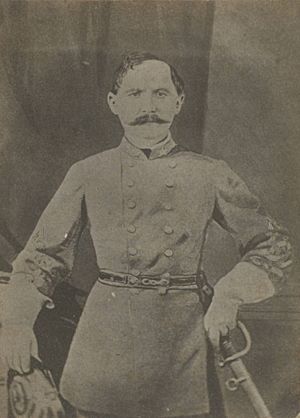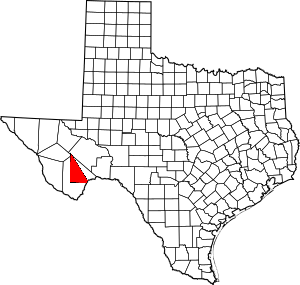Augustus Buchel facts for kids
Quick facts for kids
Augustus Carl Buchel
|
|
|---|---|

Buchel during the American Civil War, c. 1861–1864
|
|
| Birth name | Augustus Carl Büchel |
| Born | October 8, 1813 Guntersblum, Hesse |
| Died | April 15, 1864 (aged 50) Mansfield, Louisiana, United States |
| Buried |
Texas State Cemetery, Austin, Texas, United States
|
| Allegiance | |
| Service/ |
|
| Years of service | 1846–1847 1861–1864 |
| Rank | (Appointed, never confirmed) |
| Unit | First Regiment of Texas Foot Rifles (USA) Third Texas Infantry Regiment (CSA) |
| Commands held | First Texas Cavalry Regiment (CSA) |
| Battles/wars | First Carlist War |
| Alma mater | École militaire |
Augustus Carl Buchel (born October 8, 1813 – died April 15, 1864) was a soldier who was born in Germany. He served in many different armies during the 1800s. During the American Civil War, he was a colonel in the Confederate States Army.
Buchel was born in Guntersblum in 1813. He went to several military schools, including the famous École militaire in Paris. He even served in the French Foreign Legion when he was younger. After fighting in the First Carlist War, he became a military teacher for the Ottoman Empire. He might have even earned the special title of Pasha there. In 1845, he moved to the Republic of Texas. He then joined the United States Army and fought in the Mexican–American War. He even worked for Zachary Taylor, who later became a U.S. President. When the Civil War started, Buchel joined the Confederate States of America. He served as an officer mostly in Texas. By 1863, he was a colonel leading his own cavalry group. He was stationed in Louisiana and fought in the Battle of Pleasant Hill. Sadly, he was badly wounded in this battle and died a few days later. He is buried in the Texas State Cemetery, where a large memorial stands in his honor. A county in Texas, Buchel County, was also named after him for a time.
Contents
Early Life and Military Training
Augustus Carl Büchel was born in the town of Guntersblum, Germany, on October 8, 1813. When he was 14, he started at a local military academy. At 18, he became a second lieutenant in the First Infantry Regiment of Hesse-Darmstadt. He continued his military education at the École militaire in Paris. After that, he became a lieutenant in the French Foreign Legion. Buchel was a very skilled soldier and could speak seven different languages.
He fought in the First Carlist War in Spain, joining the side of Queen Maria Christina of the Two Sicilies. In 1837, he took part in the Battle of Huesca. The next year, Queen Maria Christina honored him for his brave actions in the battle. She gave him the Cross of the Order of Golden Crosses, which meant he was knighted. After this war, Buchel became a military teacher for the army of the Ottoman Empire. He rose to the rank of colonel there. Because he was a Christian, this was the highest rank he could reach. He was offered the rank of general if he became a Muslim, but he chose not to and left his job. He then went back to Germany. Some records suggest he was given the honorary title of Pasha while he was a teacher.
Moving to the United States
In late 1845, Buchel moved to the Republic of Texas with a group called the Adelsverein. Texas soon became a state in the United States. Buchel settled in Indianola and changed his last name from Büchel to Buchel. Some people say he left Germany because of a disagreement that led to a duel.
In May 1846, U.S. Army General Zachary Taylor asked for volunteers to fight in the Mexican–American War. Buchel quickly gathered a company of soldiers for the First Regiment of Texas Foot Rifles. Buchel served as their captain and was later promoted to major. During the Battle of Buena Vista, Buchel worked as General Taylor's special assistant, called an aide-de-camp. He was praised for his bravery during this battle. After the war, U.S. President Franklin Pierce appointed Buchel as the customs collector for Port Lavaca, Texas. Buchel also started businesses in Corpus Christi. He even led a company during the Crimean War. In 1859, during the Cortina Troubles, Buchel organized volunteers in Indianola, but they did not fight.
American Civil War Service
When the American Civil War began, Buchel joined the Confederate States of America and the Texas Militia. By late 1861, Buchel was promoted to lieutenant colonel in the Third Texas Infantry. This group was stationed in South Texas. In 1863, Buchel became the colonel for the First Texas Cavalry Regiment. He led his troops in military actions along the Texas Gulf Coast. They patrolled the land between the San Bernard River and the Caney Creek.
Later, his regiment moved to Louisiana. This was because the Union army might try to invade Texas through Louisiana. In early 1864, Buchel was appointed as a brigadier general, but this promotion was never officially confirmed. On April 9, 1864, Buchel led his troops in the Battle of Pleasant Hill. During this battle, he was badly wounded. He was taken to Mansfield, Louisiana, where he died several days later on April 15. Buchel was first buried in Mansfield. Later, soldiers from his regiment moved his body to the Texas State Cemetery in Austin, the state's capital. A memorial service was held there, and Texas Lieutenant Governor Fletcher Stockdale gave a speech honoring him.
Legacy
Augustus Carl Buchel was not married and did not have any children when he died. At his burial place, the state of Texas built a large stone memorial. In 1887, the Texas Legislature created Buchel County in the western part of the state. It was named in his honor. However, the county was never officially organized. By 1897, it became part of Brewster County.
In 1940, a historian named Ella Lonn wrote about Buchel. She said he was a "quiet, unassuming man." She also called him "a citizen of the Confederacy but a soldier of fortune if ever there was one!" This means he was loyal to the Confederacy but also someone who loved being a soldier and fighting in different places. In 1965, the University of Texas at Austin received many historical papers about Buchel as part of a large collection of documents.
Images for kids
 | James Van Der Zee |
 | Alma Thomas |
 | Ellis Wilson |
 | Margaret Taylor-Burroughs |



